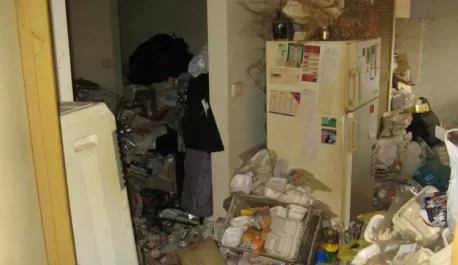
WHEN A LOVED ONE HOARDS
In our hoarding research, one of the most common inquiries we get is: “My [mother, father, sibling, friend, spouse, etc.] has a terrible hoarding problem. But he/she doesn’t seem to recognize that it’s a problem and isn’t interested in doing anything about it. How can I make him/her see that this is a problem and get the help he/she so badly needs?”The short answer: In most cases, you can’t. That is, assuming that your loved one is an adult who is legally competent to manage his/her own affairs (meaning he/she has not been declared incompetent by a judge and appointed a legal guardian), and the clutter is not immediately life-threatening, he/she has the right to hoard, even though the hoarding might have terrible consequences for his/her quality of life.
The long answer: Even though in most cases you can’t make the person do anything, you can alter your approach to minimize the likelihood of getting a defensive or “stubborn” reaction. Often, it’s tempting to start arguing with the person, trying to persuade them to see things the way you do. This kind of direct confrontation rarely works.
We find that the best way to help people increase their motivation to work on the problem is to start with three key assumptions:
- Ambivalence is normal.
- People have a right to make their own choices.
- Nothing will happen until the person is ready to change.
Here are some general principles to guide your conversations:
Show empathy. Showing empathy doesn’t necessarily mean that you agree with everything the person says. But it does mean you are willing to listen and to try to see things from the other person’s perspective.Don’t Argue. There is simply no point in arguing about hoarding. The harder you argue, the more the person is likely to argue back. The only solution is to get out of the argument.Respect Autonomy. Remember, most of you are dealing with an adult who has freedom of choice about his or her own possessions. Try to engage your loved one in a discussion (rather than an argument) about the home and his or her behavior. Ask your loved one what he or she wants to do, rather than just telling him or her what you want: “What do you think you would like to do about the clutter in the home?”; “How do you suggest we proceed?”Help the person recognize that his/her actions are inconsistent with his/her greater goals or values. Ask the person about his or her goals and values: “What’s really important to you in life?”; “How would you like your life to be five years from now?”; “What are your hopes and goals in life?” Discuss whether or not the person’s acquiring, or difficulty organizing, or getting rid of things fit with those goals and values. This is most effective if you ask, rather than tell: “How does the condition of your home fit with your desire to be a good grandmother?”; ” You’ve told me that friendships are very important to you, how well can you pursue that goal, given the way things are right now?”If you have been accustomed to arguing, threatening, and blaming, your new approaches will surprise your loved one and it may take a little time before the person begins to trust you. Try these methods in several conversations and notice whether the balance seems to be tilting in the right direction. If so, be patient and keep up the good work.